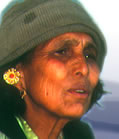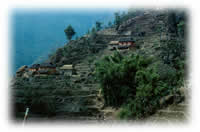 |
 |
||
 |
|||
|
RELATED THEMES agriculture communications community activities conflict development education environment politics water OTHER LOCAL THEMES BACKGROUND |
development
In the first collection, NGO projects, especially those of ActionAid Nepal (AAN), are contrasted favourably with the inefficiency of government schemes. This might reflect the fact that the interviews were largely gathered by AAN fieldworkers, but the view seems quite widespread. Improvements mentioned (whether initiated by the state or NGOs) include drinking water provision, health posts (though some areas still lack such basic amenities), veterinary services, new farming methods, irrigation, afforestation activities and credit schemes. Some teething problems with setting up new self-help groups are described, such as overcoming suspicions and mistakenly allowing organising committees to become too large and unwieldy. One narrator complains that whereas in the past people came together and built, for example, irrigation canals on a communal basis, now they expect the state to provide such infrastructure. He feels this has led to dangerous passivity, especially given that the government help sometimes doesn't materialise. The failure of government to deliver is a frequent cause for complaint: promises of canals, roads or schools that are never fulfilled or are built to a poor standard; government money intended for projects pocketed by local officials as their "allowance". On the other hand, several narrators have had positive experiences of the (government) Bagmati Watershed project and describe how it has "transformed" environments and livelihoods. Most striking, though, is the pessimistic tone of the new collection, where people speak of how their hard work has been undermined by the destruction and violence of the conflict. Agricultural labour has been lost as people have been displaced, intimidated, injured or killed. Access to markets is badly disrupted because of transport and communications problems; fear has anyway made people reluctant to travel. Development infrastructure and organisations have been broken up and schools closed. The most hopeful note is sounded by women involved in savings schemes - where such networks are still functioning, they are seen as a powerful force for improvement, as well as independence on the part of the women involved. quotes about development"[Agricultural] production has gone down. Development in the village has ceased totally. Now, due to the Maoist problem, we have not been able to take our harvested paddy to the market. The price of paddy has gone down. Many people have been displaced... The poor and ordinary people that stay there do so under constant fear from both Maoists and the army.Those who can run away.have already run away. Now the poor are still staying. In the end, the ones who suffer are the poor." "It's been around a year since the Maoists came to the village. They completely destroyed the women's savings group that we had established. Maoists came and began pointing guns. We are told not to have meetings and they would not let us organise any programmes. By buying some goats or doing some business, there could have been some profit at least. Perhaps.we could have done something big. We had a chance to make some progress. Even that is gone now." "[Maoists] destroyed buildings, the telephone exchange etc. They attacked the VDC building. They had destroyed a lot of stuff. They hit the bridge, telephone and other places. the villagers repaired [the bridge]. But they say the telephone line will be not restored for five years." "In public works like building roads, school buildings and grounds we work in groups. But now people think that it's government work to make the roads so they do not work, and they are also waiting for the government to bring them drinking water. In our ward 8 and 9 the drinking water was provided by UNICEF, and now when the upper houses are using the water there is no water for the other houses, but people say the government personnel will come and solve the problem. But if we had just asked for an expert and built it ourselves, maybe we wouldn't have this problem." "[Savings groups] didn't do a good job as they focused on men only. whatever was saved women didn't get, and it was swindled by men. Now the NGOs of these days encourage women to come forward and do things themselves. this has taught us a lot. Among banks also [there is support]. they appreciate that women repay on time, and if women were in charge then self-reliance could be there." "I have found a big difference in the projects run by the government and the other organisations. There is too much negligence and the works are done very slowly in the government projects and the works are also not up to the standard. The cement which is used in the construction of roads and bridges are not used, maybe it is because the overseer who stays in the district headquarter comes here only 1-2 times in a month and he won't be able to check the quality. The NGO-run projects have staff who work every day. it concentrates its project in a limited area." "Development requires a combination of many elements. We had to terrace the fields for higher yields, and then look for a market for our produce. We needed a quick and easy transportation system....The market needs fresh products.... The answer - a ropeway....There is no other way to raise the living standard of people in this remote area except by improving agricultural practices and setting up markets." "There is no way to open factories in the village. We don't have the road facility. The Government is also telling us that the development is not of ministers it is of the public. No one came to the hill areas; only they came up to the plain area. People who live in the plains areas they have facilities of electricity, transport, markets, they can get everything easily. Here we are not getting any facility. We can't get anything that's why we are backward." "Keeping in view that the education is the most essential part in development we have started educating the people... We ourselves do not have the resources but we have been able to run these programmes with [UNICEF's and ActionAid's] help. Since there are farmers in this area, we concentrate our programmes on agriculture, disease and treatments of animals and their developments." |
|
 There is quite a lot on development in this collection. The first interviews (Nepal 1-23) painted an overall picture of small but significant improvements in people's lives. The second collection (Nepal 24-32), gathered in 2002, presents a bleaker picture of how the conflict between the government and the Maoists has halted and often reversed people's hard-won development gains. As one woman (Nepal 25) says:
There is quite a lot on development in this collection. The first interviews (Nepal 1-23) painted an overall picture of small but significant improvements in people's lives. The second collection (Nepal 24-32), gathered in 2002, presents a bleaker picture of how the conflict between the government and the Maoists has halted and often reversed people's hard-won development gains. As one woman (Nepal 25) says: